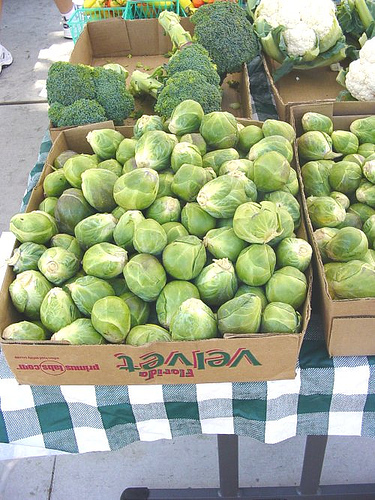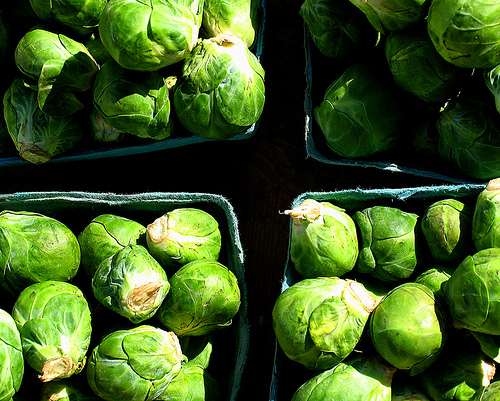
Brussels sprouts are basically the punchline of the vegetable world. Much maligned, hated by children throughout the ages, these sprouts deserve better. And if you know how to cook them, they can be very tasty. (Really!)
Brussels sprouts are basically a lot of tiny cabbages. This cultivar of the cabbage family was cultivated in ancient Rome, although it got its popular current name from the fact that it was popularized in Europe thanks to being grown in what is now Belgium in the 13th century.
Brussels sprouts like cool, damp climates, and are in season from June through January in most temperate parts of the world. Belgium and the Netherlands are still the world's largest producers of Brussels sprouts, thanks to their ideal climate and growing conditions.
Britain is the world's largest consumer of Brussels sprouts. I'm sure that fact doesn't help the reputation of British cuisine worldwide.

Image courtesy Flickr/Jasmine&Roses
Brussels sprouts nutritional information
Like the other cruciferous vegetables (including broccoli, kale, and cabbage), Brussels sprouts are packed full of nutrition. They are high in dietary fiber, vitamin A, vitamin C, folic acid, manganese, potassium, healthy omega-3 fatty acids, and many more trace elements and phytonutrients.
Out of all the cruciferous vegetables, Brussels sprouts are highest in glucosinolates, which have been shown to protect against cancer and has anti-inflammatory powers as well. They also contain high levels of a compound called indole-3-carbinol, which helps assist DNA repair and prevent the growth of cancerous cells.

Image courtesy Flickr/Esteban Cavrico
The infamous bitter Brussels sprout
Brussels sprouts contain several compounds that can make them taste bitter and skunky if they are not prepared well. The first key to ending up with delicious Brussels sprouts is to only use fresh sprouts, not frozen.
Even the most high-quality frozen sprouts will have suffered some cell damage compared to fresh Brussels sprouts, and cell damage is what releases the sulfur and other nasty compounds in the sprout. Do yourself a favor and stick with fresh Brussels sprouts!
Overcooking a Brussels sprout is the fastest route to a skunky sprout. An overcooked sprout, especially a boiled sprout, develops a pungent, cabbage-y odor in addition to its bitterness. The more you cook them, the more sulfur they release. Yuck.
Most people who hate Brussels sprouts were forced to eat overcooked, nasty sprouts as children. And who can blame them for developing a loathing? Done wrong, a Brussels sprout is terrible.
Brussels sprouts have also been improved over the decades. Sprout ranchers have worked hard to develop better strains of sprouts, and the plants today produce a much less bitter, more mild-tasting sprout than the plants of yore. Childhood memories of bad sprouts served in the 1950s may have as much to do with the specific plant variety as they did the sub-par cooking method.
If you need added incentive not to boil your sprouts, boiling significantly reduces the amount of helpful nutrients the sprouts contain. It all ends up in the water.

Image courtesy Flickr/Mr. Muskrat
The secret to cooking Brussels sprouts
First, Brussels sprouts should be trimmed well before cooking. Cut off as much of the stem as you can reach (it's woody and tough) and remove any outer leaves that look old and fibrous.
Brussels sprouts should be cooked quickly and gently. Surprisingly, for such a tough-seeming little vegetable, it takes very little to cook a Brussels sprout. Simply Recipes recommends parboiling them for three minutes, then roasting them in a skillet for about 10 minutes to give them a nice browning

Image courtesy Flickr/megabeth
Oven roasted Brussels sprouts
This is my favorite way to cook Brussels sprouts. Trim them and slice each in half lengthwise, then toss them with salt, pepper, and olive oil. Spread them out on a baking sheet and roast them at 400 degrees for about 30 minutes. Stir them around a few times during cooking, so that all sides get roasted evenly.
For an extra kick of flavor, add rosemary before baking the sprouts, and toss them with parmesan cheese just before serving. You can also roast them with bacon, for a little extra boost of fatty, salty deliciousness. Yum!
Steaming Brussels sprouts
Want your sprouts quickly with a minimum of fuss? Steam them for about 5 minutes. Don't over-steam them, it will make them bitter and skunky.
Main image courtesy Flickr/srqpix

2 comments